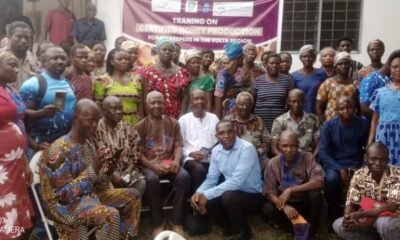News
Tackling gender discrimination …Give boys, girls equal opportunity to thrive

Boys and girls deserve an equal opportunity to thrive
Every girl and boy deserves an equal chance to survive and thrive, yet gender discrimination, continues to rob them of their childhood and limit their potentials.
The United Nations Economic and Social Commission for Western Asia (UNESCWA) defines gender discrimination as any distinction, exclusion or restriction made on the basis of sex which has the effect or purpose of impairing or nullifying the recognition, enjoyment or exercise by women, irrespective of their marital status, on the basis of equality of men and women, of human rights and fundamental freedoms in the political, economic, social, cultural, civil or any other field.
Gender discrimination has the tendency to deny girls their rights, kept from school, forced to marry and subjected to violence while her voice is undervalued. This assault on childhood also deprives nations of the energy and talent they need to progress.

According to the United Nations Children’s Fund (UNICEF), boys also suffer from gender norms. Notions of masculinity can fuel child labour, gang violence and recruitment into armed groups. No matter where it prevails, or how it manifests, gender inequality harms every member of society.
An International Organisation, Save the Children says, it will take over 200 years to achieve gender equality, and that is just in the United States of America (USA).
The organisation therefore describes as unacceptable, adding that together, we can create a more equal world, right from the start.
What are the causes of gender discrimination?
Gender discrimination begins from childhood. From the moment girls and boys are born, they face unequal gender norms as well as social norms regarding expectations and access to resources and opportunities in their homes, schools and communities.
For example, girls are most often made to carry or do household chores with the notion of preparing them for future marriage, pregnancy and caring for their children while the boys are often encouraged to go to school and get an education to prepare for work.
This tendency often leads to child marriage and pregnancy among girls.
Effects of gender discrimination
In Ghana, gender discrimination among boys and girls exposes them to the possibility of child marriage, teenage pregnancy, child domestic work, poor education and health, sexual abuse, exploitation and violence.
Girls are more likely than their male counterparts to drop out of school, marry at an early age, and experience challenges in their sexual and reproductive health and rights. They are also more likely to be exposed to violence and exploited in child labour.
Way Forward
Gender equality is a basic right for all people, including both girls and boys, it is therefore critical for Ghana to directly address gender discrimination in order to ensure that no harm comes to children while ensuring that every child attains their equal right to grow up healthily, educated and safe.
Gender equality is essential to close the inequality gaps including those who are most vulnerable.
To build a more equal, inclusive future, free from gender discrimination, Ghana needs to start in childhood.
Also according to Ghanaians Against Child Abuse (GACA), a social drive campaign for the protection of children and also aimed at reducing violence, abuse, neglect and exploitation of children, gender inequalities were drivers of many child protection violations.
They begin with boys’ and girls’ socialisation in the family, school or community which encourages them to follow specific cultural norms and roles deemed appropriate for their gender.
The gendered socialisation can mean that girls are expected to do more domestic work, not get as much or as quality schooling as boys, to marry younger, be less mobile, or tolerate physical and sexual abuse.
Conversely, it can mean that boys are expected to be more aggressive, violent, mobile, unruly and responsible for and capable of making money, having a job, etc.
GACA said it is the role of families, schools and communities to ensure boys and girls grow up with more gender equitable roles and practices, and achieve gender equitable outcomes in protection, safety and life opportunities.
According to UNICEF, Gender equality means that girls and boys enjoy the same rights, resources, opportunities and protections. In 2021, UNICEF ushered in a new gender policy (2021–2030) articulating its vision for gender equality in its programmes, as well as at workplaces and practices, around the globe.
The Gender Action Plan (2022– 2025) charts UNICEF’s way forward with a series of time-bound results that deliver lasting, transformative change for children, adolescents and women worldwide.
UNICEF and other international organisations are working with partners in Ghana on a variety of educational initiatives including the development of gender-responsive school curricula; gender training for education professionals to help eliminate gender discrimination.
Conclusion
Tackling gender discrimination in boys and girls is a collective responsibility for all Ghanaians. It is therefore important for individuals, organisations and governments to take deliberate steps to achieve gender equality for all irrespective of one’s gende
By Jemima Esinam Kuatsinu
News
UTAG, TUTAG, and CETAG threaten strike over delayed book and research allowance

The University Teachers Association of Ghana (UTAG), the Technical University Teachers Association of Ghana (TUTAG), and the Colleges of Education Teachers Association of Ghana (CETAG) have jointly issued a demand for the immediate payment of their Book and Research Allowance.
They have further indicated that failure by the government to honour this obligation will compel them to embark on a nationwide strike effective Thursday, June 13, 2025.
In a statement issued today, under the headline ‘Exchange Rate and Payment for the Book and Research (BRA) Allowance’ indicates that“The University Teachers Association of Ghana (UTAG), the Technical University Teachers Association of Ghana (TUTAG), and the Colleges of Education Teachers Association of Ghana(CETAG) wish to express our deep concern and discontent over the undue delay in releasing the exchange rate for the book and research allowance and payment.”
According to them, this delay has caused significant uncertainty and frustration among our members, who depend on this critical support for their research and academic work.
They noted that at a joint meeting held on June 8, 2025, the undersigned unions unanimously resolved that the government must, as a matter of urgency, release the exchange rate and commence the payment process for the book and research allowance to our members.
“Despite the late release of the rates.we have resolved that we will not accept an extension of payments beyond September 2025. We
stress that this allowance is a statutory entitlement under our Conditions of Service and an essential resource for advancing research, teaching, and knowledge sharing,” they added.
The joint statement further added that“We hereby notify all stakeholders that if the government fails to
UTAG, TUTAG, and CETAG threaten strike over delayed book and research allowance
The University Teachers Association of Ghana (UTAG), the Technical University Teachers Association of Ghana (TUTAG), and the Colleges of Education Teachers Association of Ghana (CETAG) have jointly issued a demand for the immediate payment of their Book and Research Allowance.
They have further indicated that failure by the government to honour this obligation will compel them to embark on a nationwide strike effective Thursday, June 13, 2025.
In a statement issued today, under the headline ‘Exchange Rate and Payment for the Book and Research (BRA) Allowance’ indicates that“The University Teachers Association of Ghana (UTAG), the Technical University Teachers Association5 of Ghana (TUTAG), and the Colleges of Education Teachers Association of Ghana(CETAG) wish to express our deep concern and discontent over the undue delay in releasing the exchange rate for the book and research allowance and payment.”
According to them, this delay has caused significant uncertainty and frustration among our members, who depend on this critical support for their research and academic work.
They noted that at a joint meeting held on June 8, 2025, the undersigned unions unanimously resolved that the government must, as a matter of urgency, release the exchange rate and commence the payment process for the book and research allowance to our members.
“Despite the late release of the rates.we have resolved that we will not accept an extension of payments beyond September 2025. We
stress that this allowance is a statutory entitlement under our Conditions of Service and an essential resource for advancing research, teaching, and knowledge sharing,” they added.
The joint statement further added that“We hereby notify all stakeholders that if the government fails to commence the payment process by the 13th of June 2025, this will be considered a strike notice by UTAG, TUTAG, and CETAG across all campuses to the government.”
“We urge the government to act swiftly to avert any disruption to the academic calendar and to ensure that the welfare of teachers and the broader academic community is prioritised,” the statement concluded.
By Edem Mensah-Tsotorme

News
Chief Imam endorses ‘Let Love Lead’s’ clean-up campaign at Nkrumah Circle

The National Chief Imam, Sheikh Osman Nuhu Sharubutu, has thrown his weight behind the upcoming city-wide clean-up exercise scheduled for Saturday, June 14, 2025, at Kwame Nkrumah Circle.
The revered Islamic leader gave his blessing during a consultative meeting with organisers of the exercise, calling the initiative a “commendable national duty” that aligns with both religious and civic responsibility.
The clean-up, which marks the third edition of a growing sanitation drive, is being organised by community stakeholders and supported by civil society groups.
This year’s exercise is especially symbolic as it coincides with the 10th anniversary of the June 3, 2015 flood and fire disaster that claimed over 150 lives at the same location.
“The well-being of our people and the cleanliness of our environment are acts of faith and service,” the Chief Imam said.
“We must all come together—Christians, Muslims, traditionalists, and non-religious people alike—to honour the memory of those lost and prevent future tragedies,” He added.
Organisers, ‘Let Love Lead’, say the Chief Imam’s endorsement adds significant moral weight to the campaign, which already enjoys growing national support.
Engagements have also been held with traditional rulers, MPs, government officials, and social influencers to galvanise wider participation.
This year’s event is expected to go beyond sanitation. Side activities include medical outreach, disaster preparedness education, interfaith prayers, and donations to victims of the June 3 disaster.
Nene Lartey Osakonor I (Big Dawood), a traditional leader spearheading coordination, described the Chief Imam’s support as “invaluable.”
He said, “We are deeply honoured by the Chief Imam’s endorsement.
“His message is a powerful reminder that sanitation is not just a government or NGO responsibility—it’s a spiritual and civic duty,” he added.
More institutions, volunteers, and media houses are expected to join the campaign as the date draws near.







